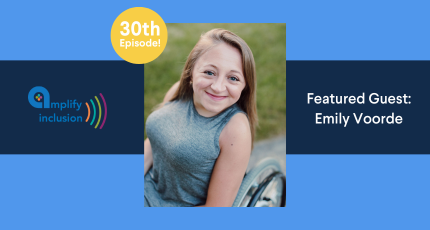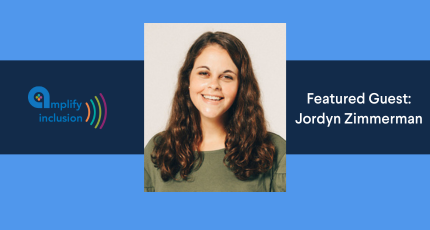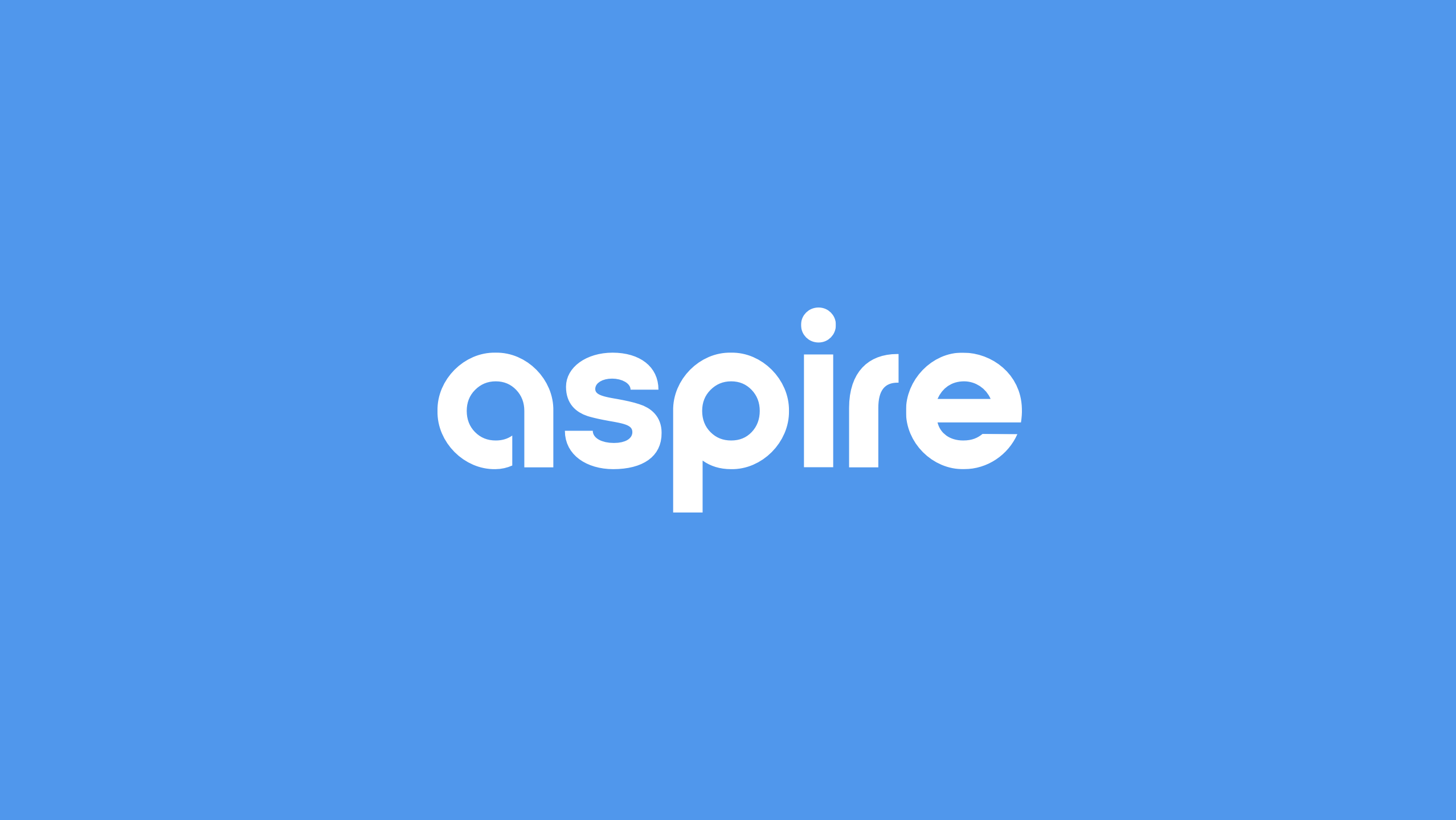S1. Ep. 3
A Powerful Partnership (Part 1)
Date
August 31, 2020
Time
20 minutes
Category
Amplify Inclusion Podcast
Share

Welcome to Amplify Inclusion, a podcast where we share authentic stories of inclusion in action.
“A natural progression is to start with laying a foundation.” Partners are critical to our mission and they begin with committed leaders. Brad Nardick, CEO of The Bazaar Inc., and Beth Forde, Director of Aspire Community Employment, tell the story of their partnership, how it began and what has made it successful. This episode is part of the Season 1 Series: ‘Workplace Transformation Starts Small’. Listen now or view the full transcript below.
This episode was produced by Aspire Inclusive Solutions and engineered, edited and mixed by Subframe Sound with music courtesy of Nealle DiPaolo.
Full Transcript
00:00:03 Clare
Welcome to Amplify Inclusion. I’m Clare Killy, Director of inclusive Solutions at Aspire. Thanks for joining us as we share real stories and conversations about the power and importance of disability inclusion. Today we’re releasing two episodes to conclude our series focused on the idea that work place transformation start small. At Aspire, we know that partners are critical to our mission and this two-part segment will detail the progression of one of those partnerships. In part one, will hear from Beth Forde, the Director of Community Employment at Aspire, and from Brad Nardick, CEO of The Bazaar Inc. Brad’s company and its retail off-shoot, Bargains In A Box, have been a partner of Aspire for a few years. Brad and Beth will discuss how the partnership began and the steps they’ve taken to make it successful. Then in part two, in addition to Beth and Brad, we’ll also hear from Manny, and employee of The Bazaar who found his position through Aspire. They’ll be discussing how the partnership continues to evolve first. Here’s Beth…
00:01:16 Beth
I am Beth Forde. I’m the Director of Community Employment. Community Employment is a program at Aspire, in Aspire Careers, and what we do is support individuals with disabilities to find and retain employment. We partner with companies and organizations in the community who are looking to diversify their workforce and support people with disabilities at their company. So we really see it as education on both ends – education for the individual to realize their rights and also that they belong in a competitive environment, and the education with the employer that the employer can provide a more inclusive environment for the individual. So we have approximately 50-60 Community Partners who we are kind of actively working with, they’re all at various stages of involvement or engagement. So we have a wide array of different industries, you know, the culinary, we have warehouse distribution, we have office clerical positions – really any industry that you can think of we have as partners. We really believe that inclusion strengthens our communities, including companies, and we really think of a partnership as a mutually beneficial relationship. The company who wants to diversify can look to us for that support and we can partner with that employer in providing them with strong and ready candidates for the roles that we can assist them in identifying. So partnerships are critical in moving our mission forward and one example of a great partnership that has developed is with Bargains In A Box.
00:03:08 Brad
My name is Brad Nardick and I am the CEO of Bargains In A Box and The Bazaar Inc. and we are a middle-market distributor of overstock consumer merchandising. So we partner with major American manufacturers and we buy their overstock that didn’t sell through the primary markets and redistribute it to middle-market retail chains across the world, as well as our own retail chains, which is what Bargains In A Box is. My grandfather started the business in 1960. He passed away when my dad was 19 and my dad dropped out of school, took over the company. There was one person who worked there at the time and he ran the company for 43 years. I came into the mix at the tail end of that, you know, taking more of the leadership role and the directional role within the company. I really think the the biggest takeaway was just seeing the way my Dad interacted with people who were on the team, people who were customers, seeing that he was like highly highly personable and he took his time and he really knew a lot about the people who were around him. And so I had that model to work off of and that’s still very much present in the value system here. You know, one of our company values is ‘it’s not just business, it’s personal’ and another one of our values is ‘people first’ and that relates to the work that we do in the disability community. I think everything from our onboarding process with how we choose to hire, who we choose to hire, is really based on getting to know the people who are looking for a job or who have come on board. Today we have about 35 people who work here who have come through different disability inclusion partnerships – it’s actually about 25% of our total staff.
00:05:07 Beth
So about a year-and-half ago, Bargains and Brad reached out to leadership at Aspire. He had done his homework and had reached out to different companies and agencies and organizations like Aspire, and calling on them to provide some perspective and and some guidance on how to start these first steps. So in the beginning, he really was just kind of information gathering and so we met and shared a little bit about the Community Employment Program and how we work and how we could support him and Bargains to help his mission of diversifying his workforce. So from the start, it was very clear that Brad was a deeply committed leader.
00:05:57 Brad
I’ve been a part of disability support since I was really young. You know, I had my own set of challenges when it came to going through the school system. I was always in some form of a Special Ed. class and I just remember always getting told a story ‘you’re not really going to do much’, you know, kind of like having like the recurring theme like, ‘you’re the special case, set your expectations low’ and I took it really personally and I think that’s one of the things that motivates me today inside the business is that I think a lot of people who come to us are incredibly talented, incredibly capable, have a lot of value to offer and have been told otherwise for a really long time. So the seed of disability support started really early on. And when I went away to school, I was in a rehab psychology program, so I had hands-on experience working with people with disabilities. And then after I got out of school, I went to the Paralympic games in 2016 as a volunteer for Team USA. But the disability hiring, about five years ago…we started our first internship program and we did not have a lot of success in the program and I think what we learned there was like you have to make it very personal. You can’t just say ‘hey, here’s the job description, do this job and we’ll come back later and see you’. So we started doing the work then and had a lot of iterations of trying to scale up our ability to hire people with disabilities and, you know, over time just through knowing more people in the community, finding more ways of getting support, you know, I learned a lot more about how to do this well. I think there was a few like big turning point moments, and I can use an example that we have with Aspire – you know, so I had found you guys online I think, and begged to come in for a meeting and then I met Jim and I met Beth Forde and it was like astonishing, like we were like, what a cool form of training, all the different supports, this is so cool. Not only that, but the culture that I experienced when I was there felt really aligned to me. It was really cool to see all these people who have dedicated their life and career to supporting the disability Community. That was the first environment I’d really been in of that nature. So I think it gave me a lot of like inspiration of what could take place here. But again, at that point our ability to execute at Bargains In A Box and at The Bazaar, was just we just weren’t quite well set up to do it yet.
00:08:38 Beth
Well Brad’s energy is contagious and just like Aspire, I think he had a larger vision of inclusion. And he understood right away that there are challenges and there are obstacles and he wanted to find out what those could be, but what it started with was inspiration and vision and he is very enthusiastic but also very realistic in his understanding of what needs to happen.
00:09:10 Brad
I really wanted to be hiring people with disabilities into like all of the job openings we had, but I just didn’t have the partners to do it and we didn’t have the right types of supports in place. And I’m not ashamed to admit that when I was trying to do it on my own, it was a disaster. The difference after that was when we went to go visit Aspire and we captured some really cool ideas and some direction from them, we had the right people here to execute and move forward. So it had an exponential effect on our ability to hire and train and retain team members with disabilities, whereas before we weren’t in a position to do that.
00:09:50 Beth
I would say the qualities of an effective partnership would be a company that is open to learning about maybe different ways that people communicate or can be successful and also a company that is flexible and agile and wants to meet the needs of all of their employers and then I think having a commitment to diversity is a really important quality.
00:10:18 Brad
I think step one is expectation setting and having a sense of shared responsibility. I find that what a community partner is often concerned about or curious about is what the foundation is and what the level of commitment is by our company to hire, and by any company. You know, are we just looking to fill jobs and say that we hire people with disabilities? Or we really well set up to support somebody who’s coming on board. And for me as a business owner, what I’m most curious about is what the process that a job candidate would go through inside of the community partner. Do they get training before they get here? Is there an assessment that we can have access to so we could kind of know what the strengths and weaknesses are of the person who were considering hiring? Will a job coach be on site or not? And then I think another thing that is a characteristic of effective Community Partnership is definitely just a sense of the partnership between the organization’s needs to be focused on having this one person who’s getting hired at that moment in time, for them to be successful. I think that is like absolutely the most important thing, that the intention is there, that we are all here to make sure this person is going to be successful. I think that is like the secret sauce, then you could work through anything. And another thing that I think is like a little more tactical is, whenever possible, if the community resource partner can come on site and tour the business with the leadership group. I think that’s a really effective method, one as you get a view of what kind of jobs and what the work environment is like, but to just give you a lot of time to get to know how each other operates. So I’d say those are some of the building blocks of each effective partnerships.
00:12:11 Beth
I think the transformation I’ve seen Bargains and Brad go through is that Brad came to us with a pretty lofty goal. And that was the beginning of his journey from there. We were able to kind of see that journey and in working with him, and Leadership working with him…I think that they are still striving for that goal, but I know that they’ve had a lot of learning experiences since then and they understand that it takes a lot of support and it takes a lot of commitment.
00:12:43 Brad
You know, it takes a few years for anything worth building to get the traction it needs and I think there’s very very few things that from day one are just going to like click and work, and so it’s been a few years of us working with Aspire, you know, the lines of communication are quite open and I’d say today, you know, it feels more like they’re, not an internal partner because we are different organizations, but we’re very closely linked. So I think our partnership has evolved to be very cohesive.
00:13:14 Beth
It’s kind of the ideal progression where a company lays down the foundation by learning as much as they can, by them discovering what has been successful for other companies, then into actual implementation where they hire individuals and train staff and that’s where you see the real transformation take place, in the culture and in people’s lives.
00:13:42 Brad
Today, I’d say a lot of the driver forward is seeing that we’ve hired some people and they’re like genuinely having like a cool result in their life as a whole. When you have results like that, it’s about way more than just a job. It’s about somebody getting an opportunity to gain self-confidence. So any aspect of the stigma around “Oh, it’s hard to hire people with disabilities…What if this? What if this? What if this?…” which I think keeps a lot of people on the sidelines, a lot of companies on the sidelines, I would say that there’s a huge reward on the other side of that, which is watching people have like a transformative experience through the work environment. I think that the best result that I could have here is that we’ve enhanced and enriched the lives of the people who have come through the program, and that to me is the most important thing.
00:14:33 Clare
I’d like to thank Brad and Beth for sharing their story. In part two, we’ll hear from an employee who was hired through the partnership discussed in today’s episode. (Manny’s voice: My name is Manny and my title and position at The Bazaar is a logistical customer service agent.) Manny will discuss the hiring process from his perspective and the impact of this career opportunity. Until then, please rate, review and subscribe to Amplify Inclusion and learn more at aspirehicago.com.
This episode was produced by the Aspire Inclusive Solutions team and co-produced and engineered by Subframe Sound.
Be Included
Get news and events information.


